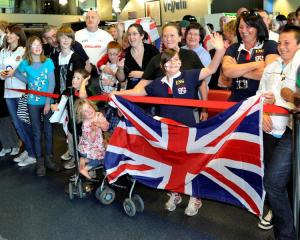Plans to deal with three kinds of waste - landfill rubbish, recyclables and human effluent - during the Rugby World Cup are in place, with sorting bins and somewhat posh portable toilets to be rolled out around Dunedin.
The city will have "only the best" temporary toilet facilities during the tournament.
Dunedin City Council events team leader Marilyn Anderson said the 55 portable toilets to be placed around town were "not worksite quality". The "sealed units" meant it was impossible to "see what's in there", Ms Anderson noted.
The units will be installed, and secured, on walking routes to Forsyth Barr Stadium (called Otago Stadium during the event) in the lower Octagon, at the railway station, and in Municipal Lane.
"They will be placed the morning, or day, before a match and will be removed prior to the next business day. So they will be out there for up to 24 hours," Ms Anderson said.
They would not be emptied while in position, although contractors would be contacted if there were any problems.
"They have a fairly large collection bowl," she said.
As they were being placed in "fairly visible sites", she expected people would feel encouraged to use them.
"We would be hoping people would use the facilities, rather than a dark corner."
Rubbish from those walking to and from the stadium and congregating in the central city would be catered for with public waste collection systems.
Council waste strategy officer Catherine Irvine said the permanent "Love New Zealand" bins, installed on city streets recently, would be "taken to the next level" for the tournament.
The three-bin receptacles with separate compartments for glass, mixed recyclables, and landfill rubbish, had received positive feedback and temporary versions of them would be set up on match days.
Sixty-four stations, without glass collection as they were in liquor ban areas, would be in place "mostly in the festival areas but also on walkways - Anzac Ave and Albany and Frederick Sts - at the railway station, in the Octagon and along Edinburgh Way.
There would also be bins inside the Dunedin Centre fan zone, and at the stadium.
They would be put out early on match days and removed by 4am the following day.
Ms Irvine was unsure how much rubbish would be collected during the event, but the system's operation would be reviewed after the first game.
"We have to live up to our reputation of being clean and green," she said.
Envirowaste commercial manager Joe Lines said an extra 40 wheelie bins, double the usual number, would be distributed to commercial customers around the Octagon to handle their anticipated extra rubbish.
Extra staff would be rostered to clear the bins for the next day.
"We will be flat out," he said.
However, it was difficult to predict how much extra landfill rubbish and recycling would be created because of the tournament, as "we've never had an event like this before".




